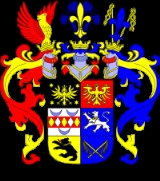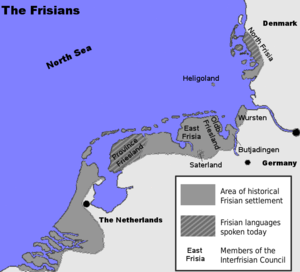
Eala Freya Fresena
Encyclopedia

Coat of arms
A coat of arms is a unique heraldic design on a shield or escutcheon or on a surcoat or tabard used to cover and protect armour and to identify the wearer. Thus the term is often stated as "coat-armour", because it was anciently displayed on the front of a coat of cloth...
of east Frisia
East Frisia
East Frisia or Eastern Friesland is a coastal region in the northwest of the German federal state of Lower Saxony....
in northern Germany
Germany
Germany , officially the Federal Republic of Germany , is a federal parliamentary republic in Europe. The country consists of 16 states while the capital and largest city is Berlin. Germany covers an area of 357,021 km2 and has a largely temperate seasonal climate...
. The motto is often mistranslated as "Hail, free Frisians!", but it was the reversal of the feudal prostration and is better translated as "Stand up, free Frisians!". According to 16th century sources, it was spoken at the Upstalsboom in Aurich
Aurich
Aurich is a town in Lower Saxony, Germany. It is the capital of the district of Aurich.-History:The history of Aurich dates back to the 13th century, when the settlement of Aurechove was mentioned in a Frisian document called the Brokmerbrief in 1276. In 1517, Count Edzard from the house of...
where Frisian judges meet on Pentecost
Pentecost
Pentecost is a prominent feast in the calendar of Ancient Israel celebrating the giving of the Law on Sinai, and also later in the Christian liturgical year commemorating the descent of the Holy Spirit upon the disciples of Christ after the Resurrection of Jesus...
and it is traditionally answered with Lever dood as Slaav, or in English
English language
English is a West Germanic language that arose in the Anglo-Saxon kingdoms of England and spread into what was to become south-east Scotland under the influence of the Anglian medieval kingdom of Northumbria...
, rather dead than slaves.
The motto refers to the legendary "Frisian freedom," a right to accept no rule besides the Holy Roman Emperor
Holy Roman Emperor
The Holy Roman Emperor is a term used by historians to denote a medieval ruler who, as German King, had also received the title of "Emperor of the Romans" from the Pope...
and the Christian God. The right was in the Middle Ages supposed to have been granted by Charlemagne
Charlemagne
Charlemagne was King of the Franks from 768 and Emperor of the Romans from 800 to his death in 814. He expanded the Frankish kingdom into an empire that incorporated much of Western and Central Europe. During his reign, he conquered Italy and was crowned by Pope Leo III on 25 December 800...
for Frisian support of Pope Leo IV
Pope Leo IV
Pope Saint Leo IV was pope from 10 April 847 to 17 July 855.A Roman by birth, he was unanimously chosen to succeed Sergius II. When he was elected, on 10 April 847, he was cardinal of Santi Quattro Coronati, and had been subdeacon of Gregory IV and archpriest under his predecessor...
(who was not contemporary with Charlemagne). It was said to have been renewed by Charles the Fat
Charles the Fat
Charles the Fat was the King of Alemannia from 876, King of Italy from 879, western Emperor from 881, King of East Francia from 882, and King of West Francia from 884. In 887, he was deposed in East Francia, Lotharingia, and possibly Italy, where the records are not clear...
in 885 for saving him from Normans
Normans
The Normans were the people who gave their name to Normandy, a region in northern France. They were descended from Norse Viking conquerors of the territory and the native population of Frankish and Gallo-Roman stock...
. The Frisian freedom basically meant a claim of freedom from tax and fief, to defend themselves against the Normans
Normans
The Normans were the people who gave their name to Normandy, a region in northern France. They were descended from Norse Viking conquerors of the territory and the native population of Frankish and Gallo-Roman stock...
, Vikings and the northern sea
North Sea
In the southwest, beyond the Straits of Dover, the North Sea becomes the English Channel connecting to the Atlantic Ocean. In the east, it connects to the Baltic Sea via the Skagerrak and Kattegat, narrow straits that separate Denmark from Norway and Sweden respectively...
. Friesland offered unclaimed land for everyone, however the unclaimed land of the country was under water half of the day. The daily fight against the northern sea ensured equality of the people who were living on warfs
Artificial dwelling hill
An artificial dwelling hill is a mound, created to provide safe ground during high tide and river floods....
during this time. Tax and fief was therefore replaced by the duty to build dikes.
Motto
For the interjection eala compare Old English éala in CristCrist
Christ, in Old English Crist, is the title given to a triad of Old English religious poems in the Exeter Book comprising a total of 1664 lines and dealing with Christ's Advent, Ascension and Last Judgment. It was originally thought to be one piece completed by a single author, but the poem is now...
(104),
- éala éarendel engla beorhtast "hail Earendel, brightest of angles!"
History

Pentecost
Pentecost is a prominent feast in the calendar of Ancient Israel celebrating the giving of the Law on Sinai, and also later in the Christian liturgical year commemorating the descent of the Holy Spirit upon the disciples of Christ after the Resurrection of Jesus...
to an annual meeting at Upstalsboom, to discuss disputes between the tribes. Friesland had a nearly democratic government, unlike most of Europe during Middle Ages. While the seajudges had been delegated to rule legally, the hovedlinge
Tribal chief
A tribal chief is the leader of a tribal society or chiefdom. Tribal societies with social stratification under a single leader emerged in the Neolithic period out of earlier tribal structures with little stratification, and they remained prevalent throughout the Iron Age.In the case of ...
had been self-elected by their wealth to rule the military. Several of them became known for supporting pirates to refinance their wealth. For example, the hoveling Keno ten Broke hosted the famous Klaus Störtebeker
Klaus Störtebeker
Nikolaus Storzenbecher, or Klaus Störtebeker , was a leader and the best known representative of a companionship of privateers known as the Victual Brothers...
.
In the late Middle Ages, Friesland
Frisia
Frisia is a coastal region along the southeastern corner of the North Sea, i.e. the German Bight. Frisia is the traditional homeland of the Frisians, a Germanic people who speak Frisian, a language group closely related to the English language...
had no central government, but was ruled by either by their local chieftains or changing foreign powers. The Frisians revolted often against the foreigners. The Stedinger revolt of 1233-34 caused Pope Gregory IX
Pope Gregory IX
Pope Gregory IX, born Ugolino di Conti, was pope from March 19, 1227 to August 22, 1241.The successor of Pope Honorius III , he fully inherited the traditions of Pope Gregory VII and of his uncle Pope Innocent III , and zealously continued their policy of Papal supremacy.-Early life:Ugolino was...
to call a crusade against them, marking the decline of Frisian freedom. Frisian freedom officially ended in 1498 when Emperor Maximilian I
Maximilian I, Holy Roman Emperor
Maximilian I , the son of Frederick III, Holy Roman Emperor and Eleanor of Portugal, was King of the Romans from 1486 and Holy Roman Emperor from 1493 until his death, though he was never in fact crowned by the Pope, the journey to Rome always being too risky...
gave Friesland as a fief to Albert, Duke of Saxony
Albert, Duke of Saxony
Albert III was a Duke of Saxony. He was nicknamed Albert the Bold or Albert the Courageous and founded the Albertine line of the House of Wettin....
to pay a 300,000 guilder
Guilder
Guilder is the English translation of the Dutch gulden — from Old Dutch for 'golden'. The guilder originated as a gold coin but has been a common name for a silver or base metal coin for some centuries...
debt, but Albert had to conquer Friesland
Frisia
Frisia is a coastal region along the southeastern corner of the North Sea, i.e. the German Bight. Frisia is the traditional homeland of the Frisians, a Germanic people who speak Frisian, a language group closely related to the English language...
himself first.

